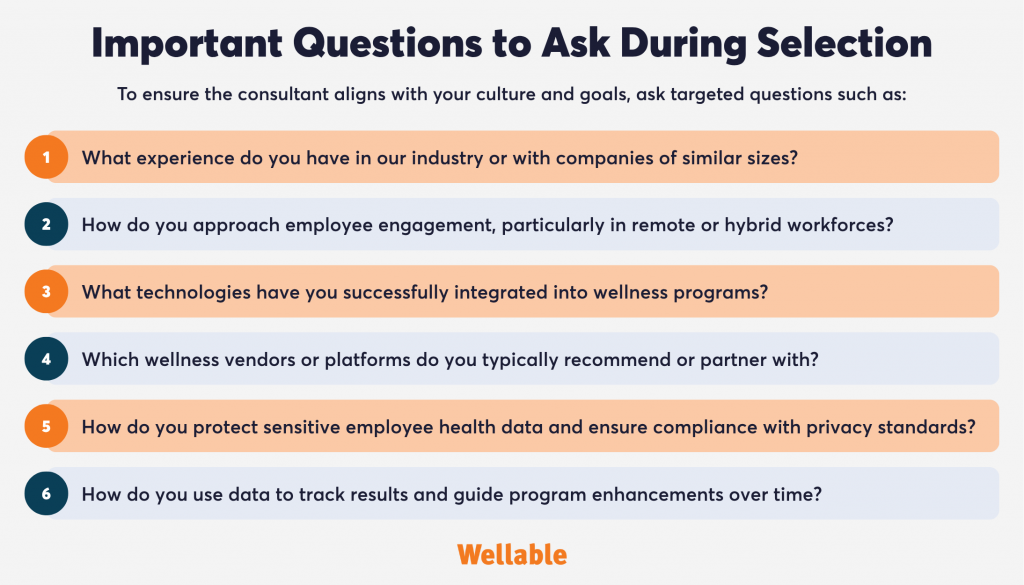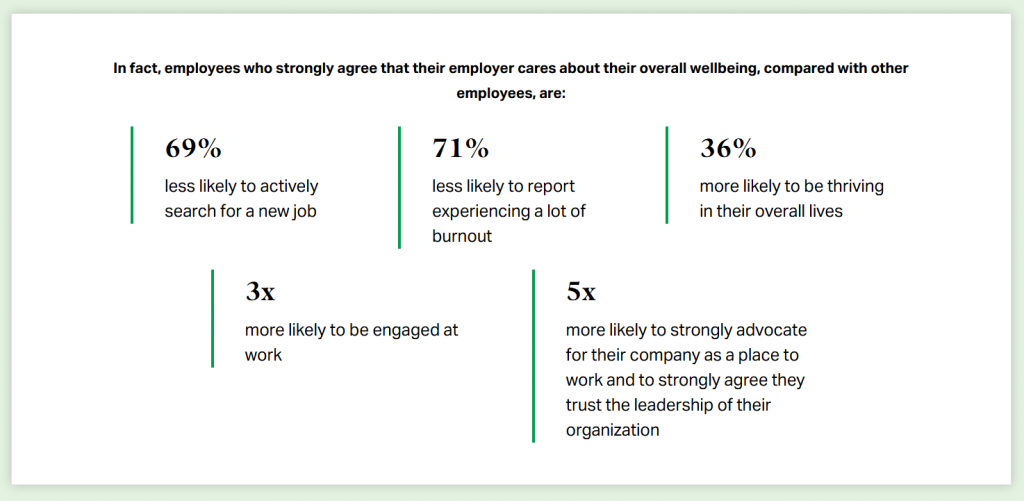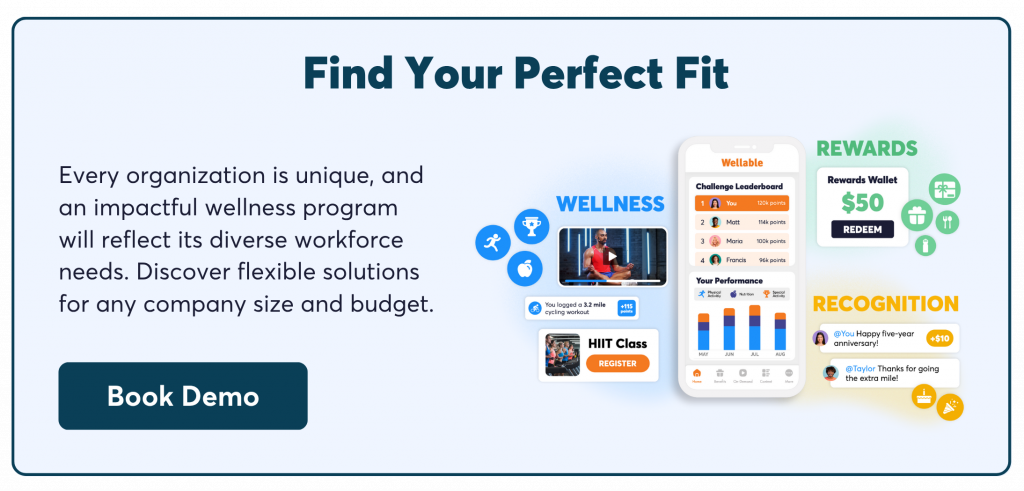Short on time? Here are the key takeaways:
- Define clear goals and metrics to guide your partnership with a consultant and measure success effectively.
- Choose a consultant with relevant industry and market experience so they can provide tailored, practical solutions.
- Foster open communication and integrate wellness into company culture for lasting engagement and impact.
- Continuously evaluate performance and ROI to adapt and improve your wellness program over time.
What is a Corporate Wellness Consultant?
A corporate wellness consultant, sometimes referred to as a population health consultant or employee benefits broker, is a professional who partners with organizations to develop and implement customized wellness initiatives that promote employee well-being. These experts focus on developing holistic wellness programs that integrate all dimensions of well-being, including physical, mental, social, and emotional health. They tailor their approach to meet the specific needs and culture of each organization, ensuring that wellness initiatives align with company goals and effectively address unique challenges.
Some corporate wellness consultants work independently, offering their expertise to a range of companies on a project-by-project basis. Other corporate wellness consultants work as part of a larger organization, such as a wellness consultancy firm, a health and benefits provider, or a health insurance brokerage.

Growth and Trends in the Industry
The corporate wellness industry is growing at an annual rate of 4.47% and is projected to reach a value of 74.9 billion USD by 2030. This growth is driven by increased awareness of the importance of employee well-being and its effects on organizational performance. For example, research shows that when employers care for worker well-being, employees are three times more engaged and 71% less likely to burn out. Corporate wellness consultants are poised to support the industry’s growth as organizations invest more into employee health and well-being and seek expertise on creating impactful wellness programs.
A major industry trend is the hyper-personalization of wellness. According to a survey of U.S. and U.K. adults, 90% of respondents want tailored wellness services, including exercise, nutrition, and health plans. This is reflected in the growing adoption of wearable health devices, the wide variety of on-demand fitness classes, and apps like ClassPass that allow users to tailor their fitness and wellness experiences on a day-to-day basis.
This shift toward more adaptive wellness experiences is a strong indicator that employees aren’t looking for one-size-fits-all programs, but personalized offerings that align with their preferences and individual health goals. If employers want to run successful wellness programs that increase productivity, engagement, and employee satisfaction, they need to offer a solution that will satisfy today’s consumers. Wellness consultants or brokers help organizations assess employees’ needs and create a program with diverse offerings that accommodate their unique workforce.
What Does a Corporate Wellness Consultant Do?

A corporate wellness consultant’s goal is to foster a work environment that supports employee well-being, driving healthier behaviors and organizational success. They do this by:
- Conducting assessments: Collecting and analyzing workforce health data, employee feedback, and organizational practices
- Reviewing existing programs: Measuring the effectiveness of current wellness initiatives and identifying ways to cut costs, close participation gaps, and improve outcomes
- Promoting sustainable wellness habits: Encouraging behaviors that support long-term physical, mental, and emotional well-being through evidence-based guidance
- Curating wellness solutions: Recommending vendors, challenges, and tools that align with company goals and employee interests
- Developing engagement strategies: Designing communication plans and incentive structures to boost participation in wellness programs
How a Corporate Wellness Consultant Can Enhance Your Wellness Program
Solve Wellness Program Challenges
Employee engagement is one of the most persistent challenges in corporate wellness, and it’s often a symptom of deeper issues. A corporate wellness consultant brings an outside perspective and the expertise needed to uncover the root causes of low wellness program participation. Whether it’s ineffective communication, lack of meaningful incentives, limited leadership support, or disconnects between initiatives and company culture, a consultant can pinpoint what’s holding the program back.
Beyond participation, consultants help identify broader program obstacles, such as misalignment with organizational goals, limited visibility, or inadequate tools for tracking impact.
Create Tailored Wellness Strategies
One-size-fits-all wellness programs struggle to make a meaningful impact. Employees have different needs, preferences, and motivations, and successful wellness strategies recognize and embrace that diversity. A corporate wellness consultant helps design dynamic programs that give employees choice and autonomy in their wellness journey, whether that’s flexibility in how people earn points (e.g., based on fitness activities they enjoy most) or selecting rewards that align with their lifestyle, such as concert tickets, wellness products, or cash incentives.
Customization impacts more than just engagement; it influences results, too. When programs are thoughtfully tailored to the unique makeup of the workforce, they’re more likely to drive meaningful, long-term behavior change and deliver measurable health and business outcomes.
Help Contain Healthcare Costs

Part of a corporate wellness consultant’s focus is ensuring a wellness program delivers measurable value. By taking a holistic approach that addresses everything from chronic disease prevention and mental well-being to fitness engagement and stress management, they help organizations reduce health risks before they escalate into costly medical claims. They focus on cultivating meaningful participation that drives sustainable lifestyle changes and supports long-term health.
With a consultant’s guidance, companies can design targeted wellness strategies that improve employee well-being and contain healthcare costs while aligning with the organization’s broader goals and program budget.
5 Tips for Working with a Corporate Wellness Consultant
1. Define Your Wellness Goals
Before engaging a corporate wellness consultant, it’s important to establish clear wellness goals that reflect your company’s priorities. Whether aiming to boost employee engagement, improve health outcomes, lower turnover, or increase productivity, clarity on your priorities sets the stage for success.
Research shows that writing goals down and having accountability increases the likelihood of achieving them by 76%. Focus on creating and documenting goals that are specific, measurable, achievable, relevant, and time-bound to increase the chance of success. Just as important is determining the right metrics to track progress. For example, if a main goal is to foster employee mental well-being, consider tracking usage of employee assistance programs or self-reported stress and burnout levels.
Coming to the table with well-defined goals and metrics empowers internal teams and the consultant to make meaningful progress. It provides a focused starting point and ensures the partnership is centered on outcomes that matter most to your organization.
2. Choose the Right Corporate Wellness Consultant
When selecting a corporate wellness consultant or employee benefits broker, industry expertise and familiarity with your market size matter. Consultants who understand your business environment are better equipped to offer practical, tailored solutions. Whether you’re in healthcare, manufacturing, tech, or education, a consultant with experience in similar industries can more effectively anticipate challenges and recommend proven strategies.
For example, companies operating in smaller or more localized markets should look for consultants or brokers with experience in similar regions or populations. These professionals will understand resource limitations, workforce expectations, and have relationships with partners and vendors that can best serve small markets. This ensures that your wellness program isn’t just well-designed, but also realistic, relevant, and resonant with your employees.
Wellable recently launched a small-market wellness solution in partnership with Brown & Brown, a leading insurance brokerage offering Population Health Consulting services. This solution supports the development of holistic wellness programs that are both accessible and impactful for smaller organizations.
In addition to industry expertise and market-size familiarity, there are specific certifications that enhance a corporate wellness consultant’s credibility and insight. Some examples include:
- Registered Dietitian Nutritionist (RDN)
- Certified Corporate Wellness Specialist (CCWS) by the Corporate Health & Wellness Association
- Certified Wellness Practitioner (CWP) by the National Wellness Institute
- NASM Certified Wellness Coach
- National Exercise Trainers Association (NETA) credentials
These designations indicate that the consultant is trained in evidence-based practices and committed to high standards of wellness programming.

3. Foster Open Communication and Collaboration
A successful wellness program thrives on communication and active collaboration between leadership, employees, and corporate wellness consultants. Creating structured opportunities for dialogue helps ensure that the program aligns with the team’s evolving needs and expectations.
Set Regular Check-ins
Consistent touchpoints, whether monthly progress reviews, quarterly strategy sessions, or more frequent pulse meetings help keep a wellness program on track. They provide a dedicated space to review data, address challenges, and refine approaches in real time.
Encourage Feedback from Employees

Employees are the most important stakeholders in a wellness program. When they feel heard, they’re more likely to stay involved and invested in the program’s success. Actively inviting their feedback through surveys, focus groups, or anonymous forms improves engagement and uncovers valuable insights.
4. Integrate Wellness into Company Culture
To maximize your wellness program’s impact and complement your consultant’s efforts, well-being must go deeper than one-off initiatives and challenges. Fostering a culture of health and well-being may require rethinking certain operational aspects of the organization.
This could look like offering flexible work arrangements (which is linked to reduced risk of heart disease), changing time-off policies to support better work-life balance, or launching a rewards and recognition program that celebrates healthy habits. When organizations are willing to make meaningful shifts that align with and support the wellness program, the impact on employee well-being and organizational success will go deeper and last longer.
According to research by Gallup, when worker well-being thrives, companies directly benefit from retention, engagement, trust in leadership, and more.

5. Evaluate the Impact of Workplace Well-Being Initiatives
Employers should regularly assess how well-being initiatives are performing, and a corporate wellness consultant can be an invaluable partner in this process.
Wellness consultants and benefits brokers bring the tools and training needed to accurately measure outcomes and calculate ROI. From analyzing participation rates and employee health trends to tracking engagement and satisfaction, they provide a full picture of what’s working and where there’s room to improve. This level of insight helps organizations make smarter, data-driven decisions about where to invest and how to adapt their wellness strategy going forward.
It’s important to evaluate program success against your determined wellness goals and metrics to ensure the wellness consultant is driving meaningful impact for the organization. Measuring progress and optimizing how you work with a corporate wellness consultant over time will ensure that the wellness program becomes a powerful, ongoing asset.
“Wellness is not static. Therefore, your wellness strategy shouldn’t be either. Wellness is dynamic and ever evolving, and wellness initiatives should be too… Data should not only be used to implement a wellness program, but it should also be used to regularly assess the program’s impact.”
Dr. Samantha Denson, Global Benefits and Wellness Manager (Corporate Wellness Magazine)













